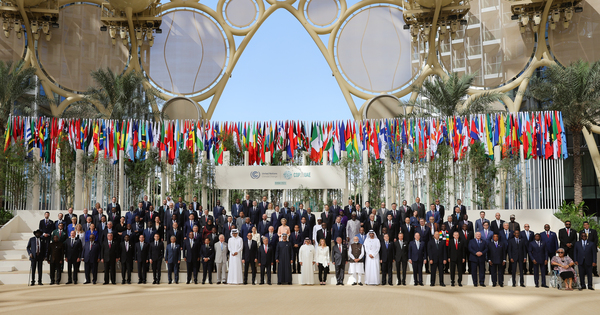By Muhammad Amaan
Leaders of the 28th meeting of the Conference of Parties of the United Nations Framework Convention on Climate Change have emphasised the need to speed up action on climate change.
This was made known today at the opening of the COP28 held in Dubai, United Arab Emirates.
The conference will be held from November 30 to December 12, 2023.
In his opening remarks, the Executive Secretary of the UNFCCC, Simon Stiell, described the current climate action process as “taking baby steps. Stepping far too slowly from an unstable world that lacks resilience to working out the best responses to the complex impacts we are facing.”
“We must teach climate action to run,” he stressed, describing this year as the hottest ever witnessed.
He added, “We are paying with people’s lives and livelihoods. We’re standing at a precipice. Facing the Global Stocktake. And we’ve got two options. Firstly – we can note the lack of progress, tweak our current best practices and encourage ourselves to do more at some other point in time.’ Or we decide at what point we will have made everyone on the planet safe and resilient.
“We decide to fund this transition properly including the response to loss and damage. And we decided to commit to a new energy system.”
Stiell further warned that the refusal to signal a terminal decline of the fossil fuel era led to the decline of humans “and we choose to pay with people’s lives.”
He also insisted on an equitable transition that meant justice within and between countries.
Speaking on the vision for COP28, Stiell said, “In 2024, countries will submit their first Biennial Transparency Report. This will mean the reality of individual progress can’t be concealed. We will also agree at COP29 on how to finance this massive shift, with the new Finance Goal.
“And let this be your first official notice that early in 2025, countries must deliver new Nationally Determined Contributions. Please start working on them now.
“This takes us to COP30, where every single commitment – on finance, adaptation, and mitigation – has to be in line with a 1.5-degree world.
“Science tells us we have around six years before we exhaust the planet’s ability to cope with our emissions. Before we blow through the 1.5-degree limit.”
He urged the leaders to take responsibility for their followers by being transparent in the bilateral actions and decisions made and focus on delivering the commitments.
“Yes, this is the biggest COP yet – but attending a COP does not tick the climate box for the year. The badges around your necks make you responsible for delivering climate action here and at home.
“To further ensure accountability, I am committing the UNFCCC to track all announcements made and initiatives launched. So that long after the cameras have gone, we can ensure our promises continue to serve the planet,” he noted.
Commitments @ COP27 speculations
In his speech, the COP 27 president and the Egyptian Minister of Foreign Affairs, Sameh Shoukry, stated that despite the challenges, COP27 succeeded in delivering elements to the global climate change agenda and ensured inclusive and effective global climate action.
Part of the successes of COP27, Shoukry said, was the establishment of the loss and damage funding arrangements, the just transition and mitigation work program and the highlighting of renewable energy as a pathway for the future.
He however stated that an assessment of the solutions and commitments made at COP27 were mostly based on speculations and assumptions that lacked a proof of realisation.
Shoukry expressed worry over the expansion of fossil fuel exploration and production despite the plan to reduce gas flaring and achieve a 1.5-degree temperature target by 2030.
The COP27 president said, “First, because most of what we bring forward as tangible solutions and actionable commitments, is based on speculation or well wishes at most, that we will be able to deliver our MDCs conditional and unconditional that developed countries will deliver the 100 million goals that the loss and damage fund established in Sharma Schiff will be replenished in billions of dollars.
“International financial institutions will be reformed to deliver, deliver all the support required and that the private sector altogether with article 2.1 Point C of the Paris Agreement is the silver bullet that will unlock the flows of appropriate finance to developing countries. These are all mere assumptions with no evident proof of reality.
“Second, rather than increasing climate finance, from developed countries it’s decreasing the growing needs and the increasing cost of finance in developing countries.
“The Green Climate Fund and the Adaptation Fund are but two examples of this worrying trend of decreased financial flows. Third, the expansion of fossil fuel exploration and production, in particular of coal in countries that previously committed to substantial phase down or in some instances completely phased out whole.
“Another worrying sign is the increased gap in renewable energy expansion and availability and the temptation of resorting to unilateral measures, either through incentives or taxes, shifting fair competition, and jeopardising multilateralism and hard-earned gains in developing nations.”
He warned that the inability to achieve the goals of the Paris Agreement has deep impacts and severe consequences.
Shoukry hopes the new leadership will address the challenges and make progress on the global climate action agenda.




